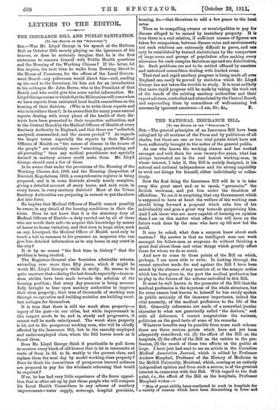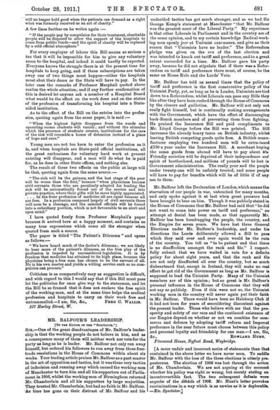THE NATIONAL INSURANCE BILL.
[To THE EDITOR Or TIER " SPECTATOR."]
Sin,—The general principles of an Insurance Bill have been eulogized by all sections of the Press and by politicians of all shades, but there are one or two vital points which have not been sufficiently brought to the notice of the general public.
As one who knows the working classes and has worked amongst and with them for over twenty-five years, what has always interested me in the real honest working-man, in whose interest, I take it, this Bill is mainly designed, is his natural and national independence and his strong capability to work out things for himself, either individually or collet. tively.
Now the first thing the Insurance Bill will do is to take away this great asset and, so to speak, "germanize" the British workman, and put him under the thraldom of officialism. To me it is surprising that any Government which is supposed to have at heart the welfare of the working man should bring forward a proposal which robs him of his individuality and goes a great way towards pauperizing him. And I ask those who are more capable of forming an opinion than I am on this matter what effect this will have on the future work done by the men who have up till now led the world.
It may be asked, what does a surgeon know about such matters ? My answer is that no intelligent man can work amongst his fellow-men as surgeons do without thinking a great deal about these and other things which greatly affect those for whom we do so much.
And now to come to those points of the Bill on which, perhaps, I am more able to write. In looking through the recent speeches made for and against the Bill I have been struck by the absence of any mention of, or the meagre notice which has been given to, the part the medical profession has to play in the future of the scheme embodied in this Bill.
It must be well known to the promoter of the Bill that the medical profession is the keystone of the whole structure, but for some reason best known to himself he has rarely spoken in public seriously of the immense importance, indeed the vital necessity, of the medical profession to the life of the Bill. Generally references are made of a somewhat jocular character to what are generically called " the doctors," and with all deference, I cannot congratulate the eminent, politician on the good taste of some of his remarks.
Whatever benefits may be possible from some such scheme there are three serious points which have not yet been adequately considered, viz. (1) the effect of the Bill on the hospitals, (2) the effect of the Bill on the entries to the pro- fession, (3) the result of these two effects on the public at large. I have just had sent to me an article in the Canadian Medical Association Journal, which is edited by Professor Andrew Macpbail, Professor of the History of Medicine in the McGill University, Montreal, which, coming as an entirely independent opinion and from such a source, is of the greatest interest in connexion with this Bill. With regard to the first point, i.e., the effect of the Bill on the hospitals, Professor Macphail writes :—
" Men of great ability have continued to work in hospitals for a variety of reasons which have been diminishing in force and
will no longer hold good when the patients can demand as a right what was formerly received as an act of charity."
A few lines further on he writes again :- " If the people pay by compulsion for their treatment, charitable people will be disposed to allow the support of the hospitals to come from public funds—and the spirit of charity will be replaced by a cold official atmosphere."
For every employer of labour this Bill means so serious a tax that it will be impossible for him to give any voluntary sums to the hospital, and indeed it could hardly be expected. Everyone knows the struggle there is at the present time for hospitals to keep going, and if these subscriptions are taken away one of two things must happen—either the hospitals must shut their doors or the State will have to pay. In the later case the remarks of Professor Macphail quoted above realize the whole situation; and if any further confirmation of this is desired let anyone ask a member of a Hospital Board what would be the effect on the work done and on the status of the profession of transforming his hospital into a State- aided institution.
As to the effect of the Bill on the entries into the profes- sion, quoting again from the same paper, it is said :-
"When the highest lights disappear from the wards and operating rooms students will vanish ; and without the stimulus which the presence of students creates, institutions for the care of the sick will resemble a house of detention instead of a place of hope and cure."
Young men are not too keen to enter the profession as it is, and when hospitals are State-paid official institutions, all the great enthusiasm for voluntary hard work at present existing will disappear, and a man will do what he is paid for, as he does in other State offices, and nothing else.
The result of these two effects on the public at large will be that, quoting again from the same source :—
" The rich will be the gainers, and the last stage of the poor will be worse than the first," because "when physicians become civil servants those who are peculiarly adapted for healing the sick will be automatically forced out of the service and into private practice, where their gifts will be more highly appreciated. . . . In the freer profession of medicine all are equal because all are free. In a profession composed largely of civil servants there will soon be a clearage, and the salaried officials will be forced into a subsidiary position, which is not favourable to an alert and open mind."
I have quoted freely from Professor Macphail's paper because it arrived here at a happy moment, and contains so many true expressions which come all the stronger when quoted from such a source.
The paper is titled " The Patient's Dilemma " and opens as follows:— " We have heard much of the doctor's dilemma ; we are likely to hear more of the patient's dilemma, as the free play of the profession is impeded by unconsidered legislation. It is by freedom that medicine has attained to its high place, because the physician being a free man has chosen to be the servant of all. He is his own master and yields a willing service such as no com- pulsion can procure."
Criticism is as comparatively easy as suggestion is difficult, and with regard to this I would say that if this Bill must pass let the politician for once give way to the statesman, and let the Bill be so framed that it does not enslave the free spirit of the working-man, and at the same time helps the medical profession and hospitals to carry on their work free and untrammelled.—I am, Sir, &c., FRED O. WALLIS.
107 Harley Street, W.











































 Previous page
Previous page